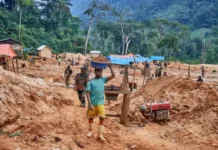A group of Zambian farmers has launched one of the country’s largest-ever environmental lawsuits, seeking $80 billion in damages from two Chinese-linked mining firms over what they describe as an “ecological catastrophe” that has devastated their communities.
The case, filed in the High Court in Lusaka, targets Sino Metals Leach Zambia and NFC Africa Mining, both subsidiaries of Chinese state-owned companies.
The farmers allege that the collapse of a tailings dam in February released millions of liters of highly acidic waste into rivers and streams in the Copperbelt, contaminating water supplies, killing fish in mass numbers, and destroying crops.
About 176 petitioners have filed the lawsuit on behalf of nearly 300,000 households said to be affected. Court documents claim that the disaster was caused by engineering failures, poor construction, and operational mismanagement at the site.
“The community’s health and livelihoods have been irreparably harmed,” the farmers wrote in their petition.
Residents reported symptoms including chest tightness and blood in urine, while crops were burned after being deemed unsafe for consumption. Even village wells, dug as alternatives, were found to be polluted.
The farmers are demanding that the firms deposit $80 billion into a government-managed account to cover compensation and environmental restoration.
They are also calling for the creation of an emergency $20 million fund to provide immediate relief, health checks, and environmental testing.
Sino Metals Leach Zambia has previously acknowledged a spill of around 50,000 cubic meters but insisted that the breach was contained within hours. The company has not commented on the lawsuit.
The disaster has raised international alarm. In August, the United States embassy in Lusaka issued a health alert, warning of “widespread contamination of water and soil” and ordering staff to leave Kitwe, the Copperbelt’s largest city. The embassy also expressed concern that contaminants could become airborne, posing inhalation risks.
Zambia’s government has sought to downplay fears. Spokesperson Cornelius Mweetwa said there was “no need to press the panic button,” insisting that the worst impacts had already passed and that there were no longer “serious implications” for public health.
Still, the case highlights growing tensions between rural communities and foreign mining interests in Zambia, Africa’s second-largest copper producer. It also underscores a broader struggle to balance the economic benefits of mining with the environmental and social costs borne by local populations.



















